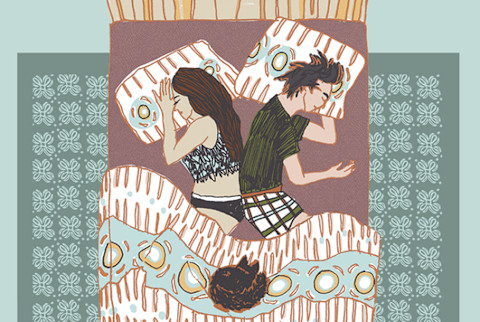
What kind of sleeper are you? Fetal roller-upper? Flailing starfish (that kinda sounds like a fancy sushi roll)? Sacked out on your stomach?
The way we sleep has a lot to tell us about our waking-life experiences; different positions can reflect our personalities, conflicts, and relationships with our bedmates, if we have them. The position in which we sleep can also have a direct impact on our bodies.
Check out what each position can tell you about the state of your sleeping mind and its impact on your waking self:
1. Fetal position
You sleep on your side with your knees tucked up toward your chest, placing your body into a ball-like shape.
Effect on the body
This position restricts our airways and can be stressful for our breathing and lungs. It also puts stress on the back and neck. It's said to contribute to the formation of wrinkles, as well. On the plus side, this position is ideal for pregnancy and for people who snore.
Reflection on self
People who like this position tend to be people who like to be in control of their life at all times; they like planning, things to be in order, and often fall prey to overthinking, worrying, and being too sensitive. Fetal side sleepers are also kind and thoughtful people. Often people under stress or pressure will sleep in this position as it feels protected and reflects a child in the womb.
2. Log Position
You sleep on your side with your legs and arms stretched out in a long line (like, well, a log.)
Effect on the body
Sleeping on your side stretched out like this is the best natural resting position for your spine, and thus can relieve back and neck pain. However, sleeping on your side can also speed up gravity's impact on your body, including sagging breasts and wrinkles.
Reflection on self
These types of people tend to be inflexible and rigid. They like rules and can often come across as bossy, headstrong, or stubborn. However, log sleepers also enjoy a challenge and aren't afraid to take control in any situation.
3. Yearning Position
You sleep on your side with your legs and arms stretched out in front of you.
Effect on the body
This position holds the same pros and cons as the log position.
Reflection on self
The yearning position is for the dream-chasers — they are opportunists and like to be challenged in life. They can be their own worst critics, too, and tend to be quite hard on themselves.
4. Soldier Position
You sleep on your back, arms by your sides, legs outstretched (like a soldier standing at attention).
Effect on the body
Sleeping on your back is considered one of the best positions for the natural flow of blood to your organs and can also help people with digestion problems. This position can be a bad idea if you are a snorer, though — honk-honk!
Reflection on self
People who sleep in this position tend to put on a confident front for the outside world, even when they're not feeling that way. They can suffer from narrow-mindedness; however, on the positive side, they are driven, focused, and tend to be loyal people. They stand tall in waking life.
5. Starfish Position
You sleep on your back, arms stretched up and legs stretched out so that your body shapes a star.
Effect on the body
This position offers the same pros and cons as the soldier position. Additionally, sleeping on your back can benefit your skin and help work against the aging process.
Reflection on self
People who rock the starfish position are often open, liberated, freethinking, and vibrant types. They are confident and open to all walks of life and all ways of thinking.
6. Stomach Position
You sleep on your stomach with your head facing into the pillow, or with the neck twisted to either side.
Effect on the body
This position can also aid digestion. However, since it's common to twist the neck so you can breathe clearly, it can be stressful on your spinal cord as it works against the natural curve of your back.
Reflection on self
Stomach sleepers tend to be confident, sociable, and friendly people who are in their element in crowds or in the spotlight and also tend to be more sensitive to the thoughts and opinions of others behind closed doors.
Related reads:
- What Your Sleeping Position Says About Your Relationship
- What Your Ability To Apologize Says About Your Personality
- Arianna Huffington's 12 Secrets To Your Best Sleep, Ever
Adapted from an excerpt of my book, The Soul Searcher’s Handbook.
